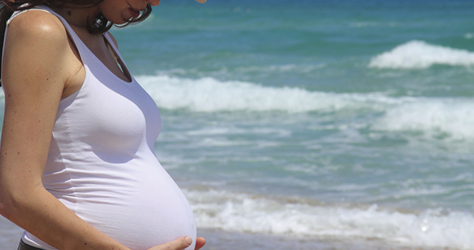Going on holiday when you’re pregnant is a glorious thing to do. Plan it properly and you can enjoy a truly relaxing holiday before you dive headfirst into all the happy chaos a newborn brings
So what’s the recipe for a pregnancy-friendly break?
At a glance
- The second trimester is the best time to travel when pregnant
- Be careful with food and drink hygiene while away - avoid salads, ice cream and ice cubes in drinks
- Protect your skin from the sun and make sure you don't get too hot
- Check your insurance policy before travelling to ensure you are covered
- Consider any vaccinations you may need before booking to ensure they won't harm the baby

The best time to travel
You can travel for most of your pregnancy, but the middle trimester is best of all. In the first 12 weeks you might feel tired and nauseous, and the risk of miscarriage is a little higher. And in the last few weeks, when you’re more likely to go into labour, it’s sensible to stay close to home.
Safe food and drink
The only rule about eating abroad is to really enjoy the glorious, new food on offer. As ever though, eat healthily and be careful about food hygiene. If you’re concerned, avoid salads, ice creams and ice cubes in drinks. Do check if tap water is safe, and if in doubt, just buy bottled water. If you do get ill, keep hydrated and keep eating if you can – it’s better for the baby.
Keep cool
Sunshine and warm weather - what’s not to like? Just make sure you don’t get too hot as it’s not ideal for you or the baby. And make sure you protect your skin from the sun, as it’s more sensitive in pregnancy.
Prepare for flying
It’s fine to fly, but do discuss any health issues or complications with your midwife before you go. Because you’re more likely to go into labour after 37 weeks (or 34 weeks if you're carrying twins), some airlines won’t let you fly in the last few weeks. So check out their policy before you book. Even at 28 weeks, some ask for a letter showing your due date and confirming you aren't at risk of complications.
If you’re flying long distance (longer than five hours), there’s a small risk of blood clots (deep vein thrombosis, or DVT). So drink plenty of water and move about regularly - every 30 minutes or so. You can buy a pair of those lovely support stockings to reduce any leg swelling. (Rock that look!). Try stretching your legs and make ankle circling movements every half an hour to improve circulation - time to show off those sexy stockings.
Safe driving
Just like any trip in the car when you’re pregnant, you can help keep fatigue and dizziness at bay by drinking regularly, eating natural, energy-giving foods, (such as fruit and nuts), and stopping regularly for a break. Keep fresh air circulating and wear your seatbelt with the cross strap between your breasts and the lap strap under your bump.
Check out health facilities
Do your research, just in case you need urgent attention. And pack your medical records - so doctors know about your pregnancy and history. You probably won’t, but best play it safe.
Consider vaccinations
Ideally pick a destination where you don’t need jabs - there are some concerns the virus or bacteria in the jab can harm the baby. Or chat to your doctor if you do need to travel further afield.
‘Pregnancy-proof’ your travel insurance
Double check sure your policy offers you cover for things like pregnancy-related medical care or the cost of changing your return trip if you go into labour.